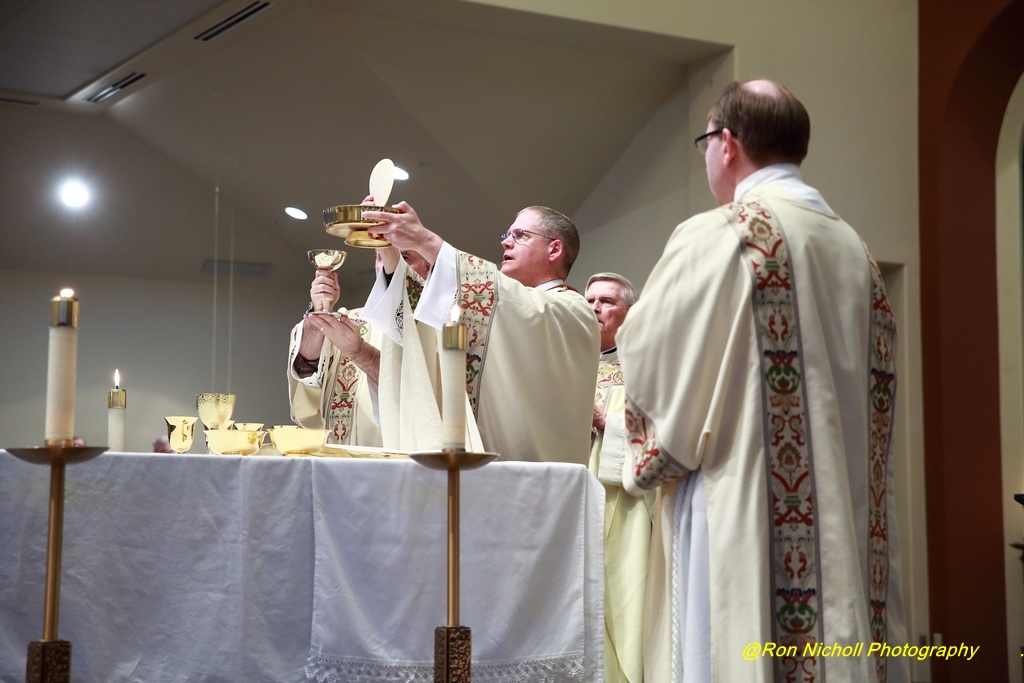 Our first reading tonight gives not only historical perspective for this night, but reminds us specifically of the history of salvation; the saving work of God on behalf of his people.
Our first reading tonight gives not only historical perspective for this night, but reminds us specifically of the history of salvation; the saving work of God on behalf of his people.
The Book of Exodus (12:1-8, 11-14) recalls how God heard the cry of the people Israel, held captive as slaves in Egypt for so many years. After sending Moses as his servant to speak and perform signs on his behalf, one final act is necessary to convince Pharaoh to let the people go. God sent the angel of death to destroy the first born in the land of Egypt, from the firstborn of Pharaoh to the firstborn of the slave-girl, as well as the firstborn of all the animals. (Exodus 11: 4-5)
The blood of the lamb, by which God marks the Israelite people, so the angel of death will Pass-over them, also foresees the means by which God will save all people from their sins.
Note the directions given by God through Moses to the people for this ritual which involves the sacrificial lamb, and see the similarities between the procured lamb and the use of its blood to the Lamb of God, Jesus Christ, who gives himself to us in the Eucharist.
First, time itself is marked: “This month shall stand at the head of your calendar; you shall reckon it the first month of the year.” What we celebrate during these holy days is the greatest moment of each year!
Notice that four days pass from the time the lamb is procured, kept, and then sacrificed. The lamb is selected on the 10th, and slaughtered on the 14th. This process of taking a lamb from its mother, from the flock, and keeping it separate – indeed – with the family; does this not recall God sending his only Son, who left his rightful place in heaven, who took on our flesh, who dwelt among us, who was taken from his mother, who loved us to the end?
One can only imagine how attached a family becomes to a young lamb in a short amount of time, only then have to slaughter the lamb in order to mark their homes with its blood and to eat its flesh. We too recall our love for Jesus, and our hearts are to be moved – indeed troubled – as he moves from the Passover meal to the garden, to his arrest, judgement, passion and death for our salvation.
This lamb of sacrifice must be a year-old male, without blemish. It is slaughtered, and its blood is used to mark the homes of the family, and they are to eat its roasted flesh with unleavened bread and bitter herbs. Because the exodus journey will finally begin at the dawn of a new day, the blood of the lamb has marked them for life, and the flesh of the lamb is nourishment for their journey, and they must be prepared to take flight.
Jesus is the Lamb of God, who without sin or blemish, in the prime of his manhood, and more importantly in the height of his glory as the Son of God, is slain on the wood of the cross. By his own words of institution in the Passover meal shared with his apostles, he anticipates this culminating moment in these words: “This is my body that is for you.” “This cup is the new covenant in my blood.”
The lips of every believer are marked with the Blood of Jesus, as we take this cup of blessing, the cup of the new and eternal covenant. As our response tonight says: “Our blessing cup is a communion with the Blood of Christ.” (1 Corinthians 10:16) Jesus feeds us with his own Body. He is food for our journey of life and faith, from life, to death, to life eternal.
Tonight’s celebration also recalls the institution of the Priesthood. The Priesthood perpetuates this new and eternal covenant of Jesus. The Priesthood is the sacrament by which the saving work of Christ continues through the preaching of God’s Word and the celebration of the sacraments of the Church. The Priesthood is the continuation of the nearness of Christ – of his love – and of his sacrificial gift of self.
Christ, mercifully and graciously at work in both the Priesthood and the Eucharist, shares his life with us, so that as the Opening Prayer for tonight’s celebration says: ‘we may draw from so great a mystery, the fullness of charity and of life.’
The love and charity of Christ is demonstrated in the washing of the feet. And as Jesus told his apostles that they are to do likewise, the same is true for all of us who are marked with the Blood of the Lamb and fed with his Body.
Jesus, the Master, became the servant of all. The Priesthood of Jesus is called to share in the same service. All who share in the life of Christ through the Eucharist are called to the same fullness of charity and of life.
In John’s Gospel tonight (13:1-15) we learned that Jesus was “fully aware that the Father had put everything into his power and that he had come from God and was returning to God.” This is our journey, for we too come from God and are returning to God. Jesus has come to accompany us on this journey. We are marked by the Blood of the Lamb – marked for life.
Jesus is the Good Shepherd, the Eternal High Priest, who helps us find our way along this journey of life back to God. He is Food for our nourishment, Strength for the journey, and the Cup that we share as a communion in his blood is the Cup of everlasting life!
5